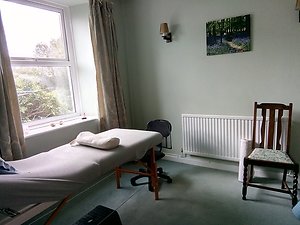Frequently Asked Questions
How long does a treatment last?
The first appointment will last an hour and a half. I will take details of your medical history and you will also receive a Reflexology or Reiki treatment. Subsequent treatments will last one hour.
What happens during a Reflexology treatment?
The treatment will begin with a relaxing foot massage. I will then work on specific points on the feet related to different systems in the body. For example, if you suffer with headaches or migraines, I may work on the toes and arches of the feet – the reflexes for the head and nervous system. Most clients find Reflexology very relaxing, some fall to sleep.
Will there be any reaction or side effect?
Whilst most find both Reflexology and Reiki very relaxing, it is possible that a healing reaction may occur after it. For example, a client may need to urinate more, or have a headache or feel very tired. Some symptoms may get worse before they get better e.g. joint pain may at first seem exacerbated before getting a lot better. If there is a lot of toxicity in the system the body’s way of clearing it may produce unpleasant side effects. On rare occasions clients can suffer a healing reaction that includes nausea or diarrhoea. It’s important to realise that this is a very good sign as the body is detoxifying. If this happens do not be put off – it is a positive sign and signals that you are on your way to healing your health issues.
How many treatments will I need and how often should I have treatments?
If you would like Reflexology or Reiki for something specific, I would recommend having a treatment once a week for 6 weeks. After this time, you will know if it has helped. You may like to have fortnightly or monthly treatments after this, for maintenance.
Should I stop other treatment or medication from my doctor?
Both Reflexology and Reiki are complementary therapies which mean that they can work alongside conventional medical treatment. However, if you are currently being treated by a medically qualified person, you will need to obtain their consent first. If they agree, it is important that you do not stop any treatment or medication that they have prescribed. If you are unsure whether Reflexology or Reiki are suitable for you, consult your doctor or health professional in the first instance.
Is there any condition that would prevent me from having Reflexology?
Reflexology is a very safe form of treatment. However, in order to protect you and me as the practitioner, it is advisable not to treat if you have deep vein thrombosis (DVT), phlebitis or blood clots. It is also advisable not to treat if you are in the first trimester of pregnancy.
If I have problems with mobility can I still receive a Reflexology treatment?
Yes, if you are a wheelchair user or find reclining on a couch uncomfortable, you can still receive a Reflexology treatment. I am trained in Vertical Reflex Therapy (VRT), also know as Vertical Reflexology. This means that I can work the top of the feet to access reflexes. When a client is in a weight-bearing (standing) or semi-weight bearing (seated) position the body's response to reflexology is accelerated as a more direct and intense link to the reflexes and the body parts that they represent is created. In fact just 5 minutes of VRT before a classical treatment (where the client is reclining on a couch) seems to prime the body, making it more receptive to reflexology.
Can Reflexology help with menstrual problems?
Reflexology can help regulate monthly cycles and alleviate period pain. It can also help reduce stress, which has an effect on the delicate balance of hormones. A research study carried out by Valiani et al. (2010) compared the effects of Reflexology versus ibuprofen for painful periods. It found that reflexology was superior to ibuprofen in reducing painful periods. Generally for any menstrual disorder a reflexologist would recommend regular treatments. For example, you could start weekly treatments for 4 weeks, then fortnightly & then regular monthly treatments for about 3 months.
Can Reflexology help with the menopause?
Regular reflexology sessions can help to balance the endocrine (hormonal system), reduce stress and help you to relax so that you sleep better. A small research study on the effect of reflexology on depression during menopause (Mahdavipour et al. 2019) discovered that reflexology can be effective for reducing women's depression during menopause. Generally for the menopause a reflexologist would recommend regular treatments. Many people find it beneficial to have 4-6 weekly or fortnightly sessions initially, followed by a more general ‘maintenance’ session every 4-6 weeks.
References
Gozuyesil, E., & Baser, M. (2016). The effect of foot reflexology applied to women aged between 40 and 60 on vasomotor complaints and quality of life. Complementary Therapies in Clinical Practice, 24, 78–85. https://doi.org/10.1016/j.ctcp.2016.05.011
Mahdavipour, F., Rahemi, Z., Sadat, Z., & Ajorpaz, N. M. (2019). The effects of foot reflexology on depression during menopause: A randomized controlled clinical trial. Complementary therapies in medicine, 47, 102195. https://doi.org/10.1016/j.ctim.2019.102195
Valiani, M., Babaei, E., Heshmat, R., & Zare, Z. (2010). Comparing the effects of reflexology methods and Ibuprofen administration on dysmenorrhea in female students of Isfahan University of Medical Sciences. Iranian journal of nursing and midwifery research, 15(Suppl 1), 371–378. https://pubmed.ncbi.nlm.nih.gov/22069413/



